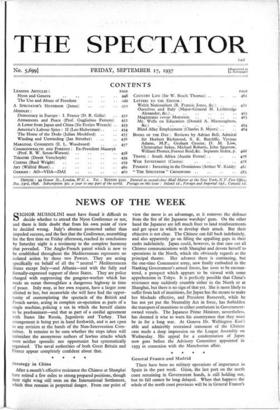Strategy in China After a month's effective resistance the Chinese
at Shanghai have retired a few miles to strong prepared positions, though their right wing still rests on the International Settlement, which thus remains in perpetual danger. From one point of view the move is an advantage, as it removes the defence from the fire of the Japanese warships' guns. On the other hand the Japanese are left much freer to land reinforcements and get space in which to develop their attack. But their objective is not clear. The Chinese can fall back indefinitely, and also apparently go on filling the appalling gaps in their ranks indefinitely. Japan could, however, in that case cut all Chinese communications with Shanghai and devote herself to operations in the North, which she obviously regards as the principal theatre. Her advance there is continuing, but the one-time Communist army, now finally embodied in the Nanking Government's armed forces, has soon to be encoun- tered, a prospect which appears to be viewed with some apprehension in Tokyo. It is perfectly possible that China's resistance may suddenly crumble either in the North or at Shanghai, but there is no sign of that yet. She is more likely to suffer from lack of munitions, for Japan has the means to make her blockade effective, and President Roosevelt, while he has not yet put the Neutrality Act in force, has forbidden the transport of munitions to either combatant in Government- owned vessels. The Japanese Prime Minister, nevertheless, has deemed it wise to warn his countrymen that they must be in for a long war. At Geneva Dr. Wellington Koo's able and admirably restrained statement of the Chinese case made a deep impression on the League Assembly on Wednesday. His appeal for a condemnation of Japan now goes before the Advisory Committee appointed in 1933 in connexion with the Manchurian affair.










































